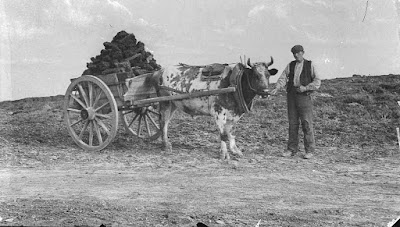One wild place in Orkney is the island of Swona.
Swona is an island situated in the Pentland Firth, south of Orkney and to the West of South Ronaldsay. It is often confused with Stroma which is further South and therefore seen as part of Caithness.
This island has been uninhabited since 1974 when batchelor Jim Rosie left and there were only ever about 8 houses on the island. Its position in the Pentland Firth means that it is not easily accessible and therefore it is rarely visited.
People who have made the trip have returned with descriptions of houses left as if the occupants had meant to return moments later. Pictures are still on the walls and the tables are set for tea.
The only inhabitants are a herd of beef cattle which are now feral and have become a seperate species. Apparently, these cattle forage for seaweed and move around the island in one unit like a scary cow gang. As somone who is already scared of cows, I have made a mental note to never visit this island.
As for wild men and women, the amphibious, shape-shifting Finfolk were said to live in Finfolkaheem, described variously as either a vanishing island, a city at the bottom of the sea, or perhaps the island of Eynhallow.
'The sand of that country was gold dust, its palaces, built of coral and crystal and adorned with pearls and precious stones, shone like stars in the weird light of that magic land; all furniture and utensils were silver and gold; the halls were hung with gorgeous curtains, the colours of which were like the aurora borealis in most brilliant coruscations.'
Sanday man Arthur Deerness was apparently dragged down to this magical submarine land and enchanted by a mermaid named Auga. He forgot all about his family, home and fiancé Clara Peace.
Clara was distraught at his appearance and the local speywife, Marion of Grindalay determined to help her. Locking herself away for the night, Marion emerged in the morning looking spent yet cheerful.
Meanwhile, Arthur's first night in Finfolkaheem had been full of rich foods, fine wines and the bed of Auga. The only irritation had been a black cat which stole some food, spilt his wine and came between him and his mermaid bride in their matrimonial bed. The cat later appeared whilst the couple sat together and, grabbing Arthur's finger, traced a cross on Auga's brow.
The enchantment was instantly broken and Arthur found himself on the rocks at Hamaness, the exact spot he'd disappeared from, free to return to Clara's waiting arms.
Image of Swona's feral cattle taken from article Feral Cattle of Swona, Orkney Islands, by S. J. G. Hall and G. F. Moore.
Finfolkaheem story taken from Walter Traill Dennison's Orkney Folklore and Traditions and information on Fin Folk taken from The Folklore of Orkney and Shetland by Ernest W. Marwick.








